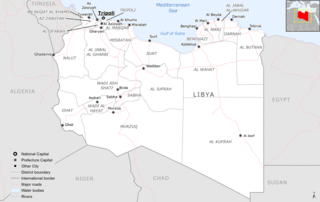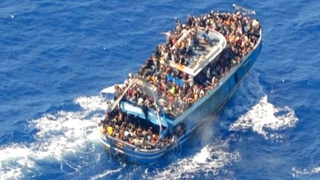
Lampedusa is the largest island of the Italian Pelagie Islands in the Mediterranean Sea.

The European Border and Coast Guard Agency, commonly known as Frontex, is an agency of the European Union headquartered in Warsaw, Poland. In coordination with the border and coast guards of member states, it exercises border control of the European Schengen Area, a task within the area of freedom, security and justice domain. Formally, the Agency's remit is to "support Member States on the ground in their efforts to protect the external borders"; it does not have authority to act otherwise unless "external border control" [by a member state] "is rendered ineffective to such an extent that it risks jeopardising the functioning of the Schengen area".

In 2021, Istat estimated that 5,171,894 foreign citizens lived in Italy, representing about 8.7% of the total population. These figures include naturalized foreign-born residents as well as illegal immigrants, the so-called clandestini, whose numbers, difficult to determine, are thought to be at least 670,000.

The Protector-class coastal patrol boats are a class of coastal patrol boats of the Maritime Squadron of the Armed Forces of Malta. They are 87-foot (27 m) patrol boats based on the Stan 2600 patrol vessel design from the Netherlands shipbuilding firm Damen Group. The Hong Kong Police were the first organization to order vessels based on this design. The United States Coast Guard (USCG) has 73 patrol boats from this class, where they are known as the Marine Protector class. Malta ordered two vessels, and they were built by Bollinger Shipyards to the USCG specifications under the US$13 Million grant from the United States provided by the United States Securities Act of 2000. They were given pennant numbers P51 and P52. In 2013, both patrol boats were upgraded with new equipment including infrared cameras and a rigid hull inflatable boat. The upgrade cost €1.7 million and was co-funded by the European Union’s External Fund.
On 3 October 2013, a boat carrying migrants from Libya to Italy sank off the Italian island of Lampedusa. It was reported that the boat had sailed from Misrata, Libya, but that many of the migrants were originally from Eritrea, Somalia and Ghana. An emergency response involving the Italian Coast Guard resulted in the rescue of 155 survivors. On 12 October it was reported that the confirmed death toll after searching the boat was 359, but that further bodies were still missing; a figure of "more than 360" deaths was later reported.
The Migrant Offshore Aid Station (MOAS) is an international humanitarian non-governmental organization based in Malta that provides aid and assistance to vulnerable communities worldwide. MOAS main focus is responding quickly and efficiently to emerging crises and make a difference in people's lives.

The 2015 European migrant crisis was a period of significantly increased movement of refugees and migrants into Europe, namely from the Middle East. An estimated 1.3 million people came to the continent to request asylum, the most in a single year since World War II. They were mostly Syrians, but also included a significant number of people from Afghanistan, Pakistan, Iraq, Nigeria, Eritrea, and the Balkans. The increase in asylum seekers has been attributed to factors such as the escalation of various wars in the Middle East and ISIL's territorial and military dominance in the region due to the Arab Winter, as well as Lebanon, Jordan, and Egypt ceasing to accept Syrian asylum seekers.
Operation Mare Nostrum was a year-long naval and air operation commenced by the Italian government on 18 October 2013, which rescued at least 150,000 migrants on the dangerous Mediterranean sea crossing. The operation ended on 31 October 2014, and was superseded by Frontex's Operation Triton.

Operation Sophia, formally European Union Naval Force Mediterranean, was a military operation of the European Union that was established as a consequence of the April 2015 Libya migrant shipwrecks with the aim of neutralising established refugee smuggling routes in the Mediterranean. The operational headquarters was located in Rome. The EU mandate for the operation ended on March 31, 2020. Operation Irini is the successor operation.

This is a timeline of the European migrant crisis of 2015 and 2016.

Proactiva Open Arms (POA) is a Spanish NGO devoted to search and rescue (SAR) at sea. Set up in October 2015, it carried out its first rescue action that same month from its base on the Greek island of Lesbos. As well as maintaining a permanent base on Lesbos, the NGO carries out its rescue operations from three ships, a sailing yacht Astral, the Golfo Azzurro and Open Arms.
Immigration to Malta has increased significantly over the past decade. In 2011, immigration contributed to 4.9% of the total population of the Maltese islands in 2011, i.e. 20,289 persons of non-Maltese citizenship, of whom 643 were born in Malta. In 2011, most of migrants in Malta were EU citizens, predominantly from the United Kingdom.

2018 Libya migrant shipwrecks began on January 9, 2018, when up to 100 migrants went missing as their migrant rubber boat was punctured and sank off Libya's coast.
SOS Méditerranée is a European, maritime-humanitarian organisation for the rescue of life at sea, currently operating in the Mediterranean sea in international waters north of Libya. The organization chartered the Aquarius and more recently the Ocean Viking in order to rescue people fleeing by sea from Libya and who risk drowning. The group was founded in June 2015 by German former captain Klaus Vogel and Frenchwoman Sophie Beau after the Italian navy ended the rescue Operation Mare Nostrum in 2014. Its headquarters are in Marseille (France), Milan (Italy), Frankfurt (Germany), Geneva (Switzerland).

Detention centres in Libya are criminal enterprises run by gangs of human traffickers and kidnappers for profit. Lawlessness in Libya has resulted in circumstances where criminals gangs abduct and detain people who are migrating to or through Libya. 5,000 migrants are held in dozens of camps that are mostly located around Bani Walid. Detainees often suffer torture and may face execution if their family do not pay ransoms to the gangs.
Externalization describes the efforts of wealthy, developed countries to prevent asylum seekers and other migrants from reaching their borders, often by enlisting third countries or private entities, including criminal groups. Externalization is used by Australia, Canada, the United States, the European Union and the United Kingdom. Although less visible than physical barriers at international borders, externalization controls or restricts mobility in ways that are out of sight and far from the country's border. Examples include visa restrictions, sanctions for carriers that transport asylum seekers, and agreements with source and transit countries. Consequences often include increased irregular migration, human smuggling, and border deaths.
The European Union response to the 2015 migrant crisis focused on how the countries organized the efforts in response to the 2015 European migrant crisis at the EU level. The European Commission in May 2015 proposed distributing the incoming refugees based on GDP and population. This proposal was divisive with Slovakia, Hungary, Romania and the Czech Republic refusing any refugees. Some nation states then called on the EU to reduce funding for member countries who did not want to share burdens and didn't share "values...need to start asking themselves questions about their place in the European Union". This attempt to coalition build failed, the European Commission proceeded to strengthen existing systems such as the Common European Asylum System (CEAS), reforming the Dublin Regulation and centralizing the asylum process. There was also challenges to the European borders which came from the Mediterranean Sea; as a response the European Border and Coast Guard Agency engaged in a new operation called Operation Triton.

On 14 June 2023, an Italy-bound fishing trawler smuggling migrants sank in international waters in the part of the Mediterranean known as the Ionian Sea, off the coast of Pylos, Messenia, Greece. The boat, named Adriana, which had a capacity of 400 people, carried an estimated 400 to 750 migrants, mostly from Pakistan, Syria, Palestine, and Egypt, and some from Afghanistan. After departing from Tobruk, Libya, on 10 June, concerns were raised by 13 June, with the vessel then located in the Maritime Search and Rescue (SAR) zone assigned to Greece. The Hellenic Coast Guard (HCG) helicopter and later the HCG vessel ΠΠΛΣ-920 arrived on scene, took aerial photos of the vessel, made offers of assistance that were allegedly refused, then remained there as an observer until the boat capsized and sank. After the Adriana had sunk "close to the deepest part of the Mediterranean Sea", the HCG and the military initiated a massive search and rescue operation. One hundred and four men were rescued, and 82 bodies were recovered. By 18 June, officials had acknowledged that over 500 people were "presumed dead."














